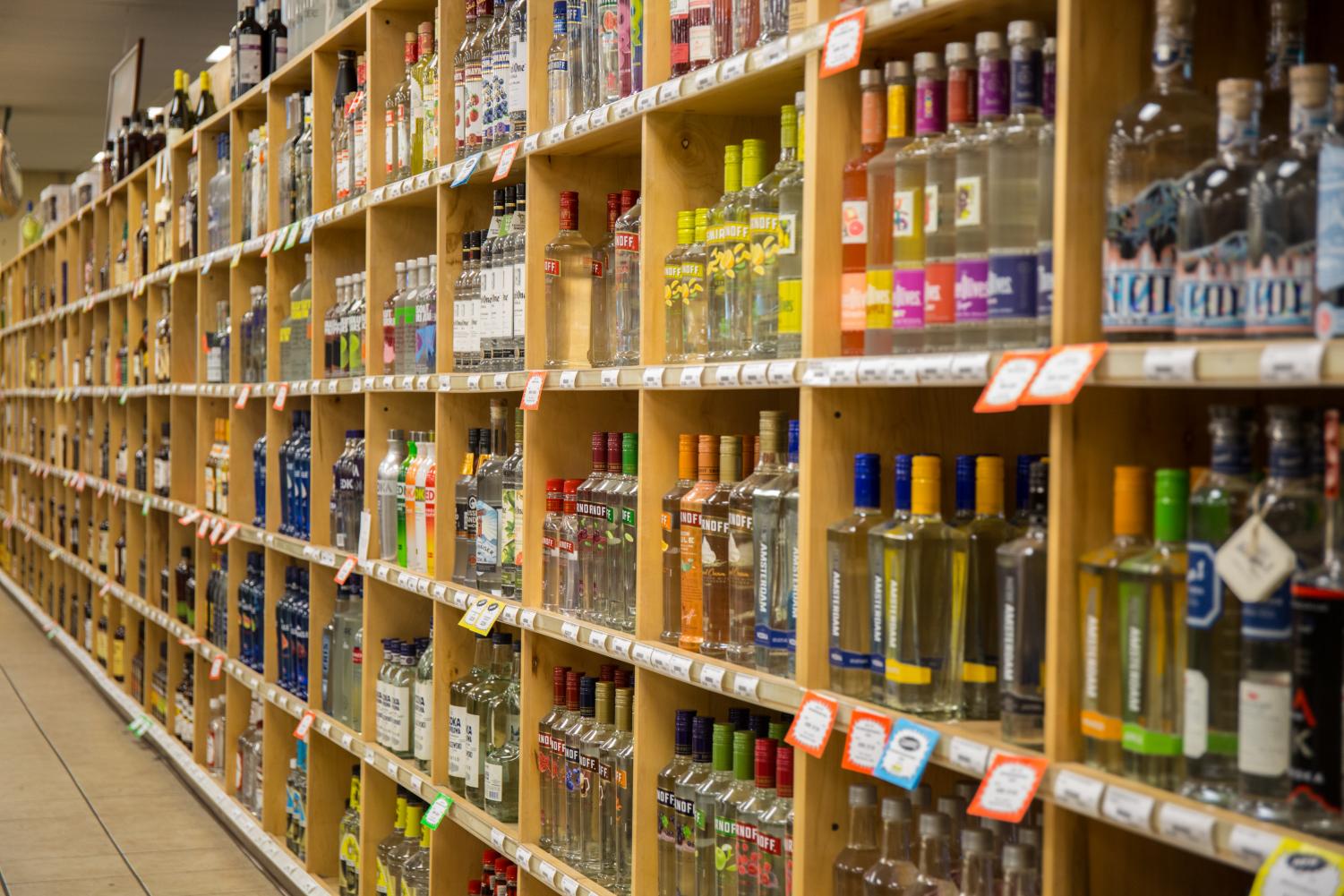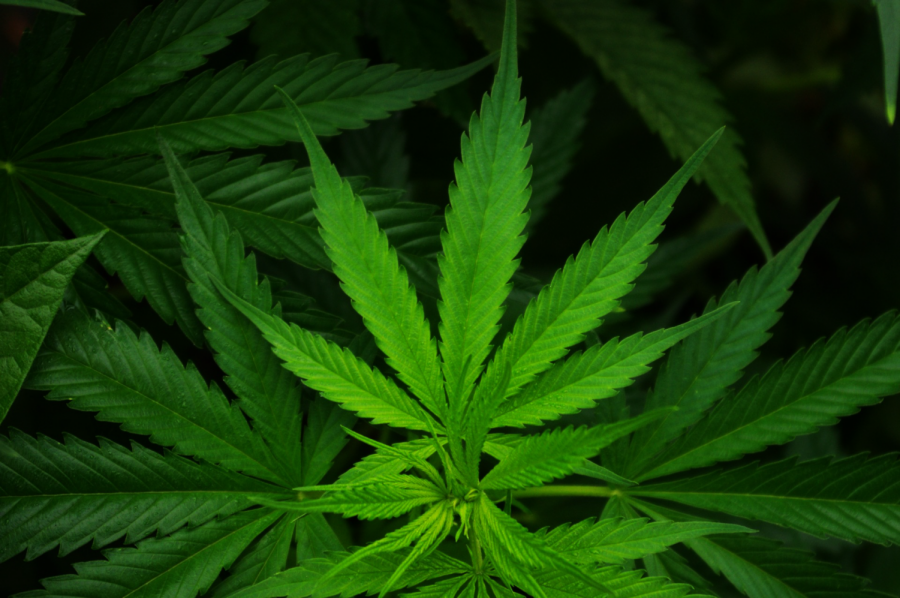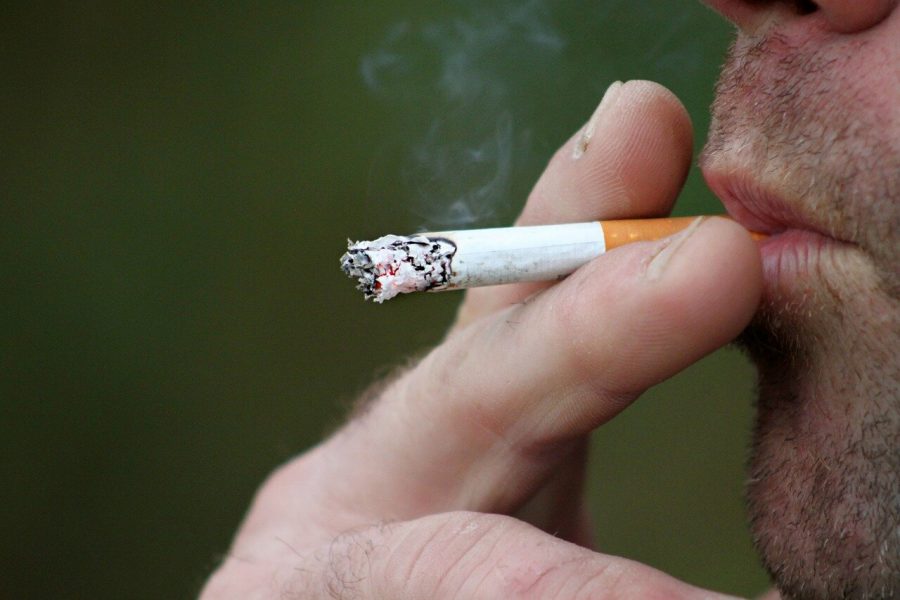Head to Head: Should Government Regulate Morality on the Grounds of Health?
November 7, 2019
Two of our opinion writers, Paij Chavez and KC Cushman, have opposing perspectives on how much the government should regulate moral decisions — like drug abuse or sex work — in the name of protecting public health.
Cannabis sativa leaves | Chronicle archives
Chavez: We Should Fix Social Problems, Not Punish Victims
“Legislation of morality” is common phrasing around criminal statutes against gambling, alcohol and drug use, pornography and certain sexual acts. Utah is a good example of a state that regularly dabbles in “morality legislation.” The vast majority of its elected officials are members of The Church of Jesus Christ of Latter-Day Saints, and many support guidelines in church doctrine that disavow certain substances and behaviors. Utah’s state history has parallels with the early history of the United States — a group fleeing religious persecution from a large, powerful government took over a chunk of land and formed their own territory with a government that reflected their values. Despite resisting involvement from their previous oppressive government, both Utah and the United States would end up crafting legislation that solidified their personal religious values onto the general public.
However, the concept of morality legislation is not entirely specific to Utah. The religious background of lawmakers the country has a similar, localized impact on what a state’s version of “morality” is and how it’s upheld and enforced through law. Centuries later, some puritanical, conservative values remain embedded in many states, despite “separation of church and state” and increasingly changing attitudes toward religion. This leads to a hotbed for confusion and distrust. When it comes to criminalization, should anyone really have the authority to decide what is and is not moral behavior?
Thou Shalt Not
Some morality seems obvious. Most people agree that intentionally killing or harming someone is a crime. Taking or damaging property that does not belong to you should be considered a crime. “Thou shalt not kill’ and “thou shalt not steal” are well-known commandments in the Old Testament that just about everyone can agree with. Personally, I connect to the teachings of Buddhist ethics, which has an important emphasis on non-violence. If someone commits a violent crime, I believe there should be consequences — but also I don’t want consequences that seem violent for that same reason.
And what about non-violent behaviors that are less of an obvious threat to public safety? What role, if any, does the government have in legislating what a consenting adult does with their own body? In a country founded on individual freedom and liberty, morality legislation sure puts a lot more limitations on citizens — and these limitations that can be actively harmful.
Moral for Some, Dangerous for Others
Too often, legislation around specific behaviors has been defended with morality-infused language. The prohibition of alcohol in the early 20th century was passed to protect the family. Instead of inspiring temperance, it increased bootlegging, and violent crime organizations exploded in many major cities.
Around the same time, a campaign to criminalize marijuana was fueled by racist tropes of white women being ‘corrupted’ by black jazz musicians and xenophobic fears of Spanish-speaking Mexican immigrants moving north after the Mexican Revolution. Even using the word “marijuana,” (instead of cannabis or hemp) was an intentionally derogatory part of the political campaign.
Mandatory sentencing for drug-related offenses, including marijuana, were put into place in 1956. Once cannabis use increased in the 1960s among the white upper-class population, Presidents Kennedy and Johnson both commissioned research into the substance. The reports found no link between cannabis use and potential for violence or heavier drug use — yet it is still federally illegal and many U.S. citizens remain incarcerated for the sole charge of possession of cannabis. How moral. Clearly, the rationale behind morality legislation is that to keep someone “safe” from the harmful effects of drugs or alcohol, society must punish them if they are caught using it.
The same applies to prostitution and other forms of sex work. If the state protects citizens from harm, how is this accomplished by throwing people in a cell, charging them with a large fine and labeling them a criminal for sex work? There are better ways to address human trafficking or exploitation without punishing the victims.
Breaking Through Binary Morality
Sociopolitical issues are always talked about in binary ways — good or bad, legal or illegal. This is a result of the punitive model of justice that the United States employs. Instead of analyzing what circumstances lead to a crime being committed, the current system is much more open-and-shut. Mental health and socioeconomic status are usually not accounted for, and once someone is in the system, they must carry the additional stigma of being labeled a criminal.
Tobacco and nicotine use is a great example of how the government can evolve its stance on an issue, and make changes for the health of citizens without curtailing autonomy. Smoking used to be far more common in the U.S., but after years of research into the deceptive marketing and negative health effects of tobacco products, the government decided to step in and make some changes. Advertising completely changed, and consistent health communication campaigns are informing the public of possible and probable effects. By 2017 smoking was reported to be at an all-time low, and this was accomplished without the government banning cigarettes or arresting anyone for smoking in public.
The ability of the U.S. to support the physical, mental and emotional health of citizens and make communities safer is not contingent on the criminalization of vice. We can acknowledge the overlap of certain non-violent behaviors and public health concerns. Smoking around others is inappropriate and unfair. Operating a vehicle while intoxicated is dangerous and selfish. Pornography might depict a lack of consent and enforce damaging stereotypes. I am not against the regulation of products and services so much as I am against the criminalization and stigmatization of people for being human. The goal should not be to catch someone doing something wrong, but to understand and fix the social and environmental factors that contribute to the so-called immoral behavior.
(Courtesy Needpix)
Cushman: By Regulating Morality, the Government Protects Its Citizens
To some extent, human morality is formed around human health and well-being. Casual sex with multiple partners, gambling and drug use have the potential for detrimental results, and for this reason, it is reasonable for them to be at the center of many moral arguments throughout time and today. These behaviors hold the capacity to endanger both individuals and society, which is why some governmental regulation is necessary in order to promote the health and wellness of the public.
It is estimated that over 20 million people in the United States have a substance abuse disorder. This would mean that there are more people with substance abuse disorders in this country than there are with cancer. There are certain dangers associated with other “immoral” behaviors that plague society in a real and dangerous way. There are well-known health risks associated with things like drug use and sex with multiple partners, such as liver problems, brain damage and the possibility of contracting an STI. Ultimately, if people choose to engage in behavior that could negatively affect their health and well-being, that is their choice, but it should not be allowed to snowball into a public health risk.
The problem arises when a person’s right to self-determination infringes on other people’s rights and overall well-being. It is clear that the negative effects of smoking, alcohol and drug use extend far beyond the individual. Children who have seen their parents drunk (even only a few times) are twice as likely to repeatedly get drunk themselves. When parents abuse drugs, this trend becomes even stronger, as the children of addicts are eight times more likely to develop an addiction in their own life. Kids see what their parents do and copy that behavior.
Families who are exposed to substance abusers are not only more likely to establish an addiction themselves, but they also are more likely to have unhealthy family dynamics and certain psychological consequences as a result of their relationship with a substance abuser. This is not to imply that everyone who drinks or engages in drug use is an addict or causes harm to those around them, or that substance abusers are innately terrible people. It is simply to state that there are very real consequences that other people might have to face due to the lifestyles of others, regardless of their own personal decisions.
Furthermore, society as a whole faces consequences as a result of immoral behavior. Substance abuse disorders damage the economy. They cost more than $420 billion a year in the form of healthcare costs, lower economic productivity and costs accrued in the criminal justice system. Substance abuse does not just affect abusers and their families — it affects everyone in the United States.
Other behaviors have consequences as well. It is realistic to admit that pornography can have detrimental aspects that damage others. Studies show that exposure to violent pornography puts individuals at increased risk for committing sexual offenses, and holding beliefs that trivialize rape or blame rape victims themselves. Again, this is not to say that everyone who watches porn is a sex offender or a danger to society. However, with little regulation the industry can have a real negative impact. Widespread “personal and private” consumption does not preclude damaging behaviors and opinions.
Morality can be difficult to define, but ultimately it comes down to this — one of the government’s primary responsibilities is to protect its citizens. When the government does not regulate dangerous behavior, it neglects an important obligation. Sometimes the government must curtail our rights as citizens in order to adequately defend us. Ultimately, we must sacrifice our rights to certain behaviors so that the government’s protection can be applied adequately and for all citizens. Common sense regulation of morally corrupt behavior is necessary to ensure people’s safety. It doesn’t mean the legislation is abnormal or unnecessarily oppressive. For instance, smokers have the right to smoke, but they are limited to certain areas because their choice should not damage the health of those around them.
Still, I am not naïve, and I understand that drug abuse and violent pornography will not disappear just because the government bans them. Nor do I believe that all behaviors that I disagree with should be ultimately abolished. However, I do firmly believe that if drug use was regulated effectively, families of drug users would be spared the consequences of a decision that wasn’t theirs to make. Porn is an incredibly hard industry to regulate, but innovative regulation could make the industry more compassionate towards women and encourage its consumers to be more compassionate as well. Regulation of moral issues promotes the health and well-being of society and that, simply put, is a good thing.





